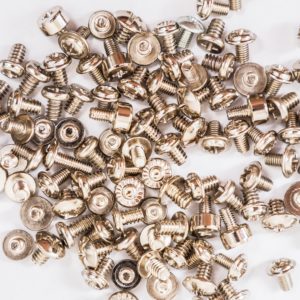 The revenue of screw, nut, and bolt manufacturing in the U.S. reached $28 billion in 2008, so it’s no surprise that when it comes to traditional and custom fasteners, there are all sorts of options for different products you can use. For the casual user, it can be difficult to determine whether you need to use nails or small screws to complete your design. It may even be a challenge for you to tell the difference between small nails and micro screws. Screw manufacturers can create virtually all kinds of custom fasteners to suit your needs, but do you know when it might be better to use nails instead? Here’s a brief guide on when you should use screws and when you should opt for nails:
The revenue of screw, nut, and bolt manufacturing in the U.S. reached $28 billion in 2008, so it’s no surprise that when it comes to traditional and custom fasteners, there are all sorts of options for different products you can use. For the casual user, it can be difficult to determine whether you need to use nails or small screws to complete your design. It may even be a challenge for you to tell the difference between small nails and micro screws. Screw manufacturers can create virtually all kinds of custom fasteners to suit your needs, but do you know when it might be better to use nails instead? Here’s a brief guide on when you should use screws and when you should opt for nails:
Check out our EZ Screw Builder to build your custom screw!
What’s the main difference between nails and screws?
While they may sometimes look similar, these standard or custom fasteners are definitely not the same. Essentially, screws offer more resistance to breaking under tension, while nails have better resistance to motion. Think of it this way: if you’ve inserted both a nail and a screw into a wooden board about halfway, the screw will be more resistant to you attempting to pry it out. In contrast, if you were to hit both with a hammer, the nail will probably only bend a bit, while the screw will likely break.
So which custom fastener should I choose for a given job?
If a lot of gravity or weight will be bearing down on the fastener, a screw is usually the better option because the materials will be less likely to separate. But if the fastener and its materials will be moving around a lot (like on a deck), you should go with a nail instead.
If a project I’m working on needs to be structurally sound and calls for nails, is it okay to use screws instead?
Generally, code books have specifications when it comes to nailing requirements and are actually designed with nails in mind. Screws may seem like a good idea, but you’ll definitely need approval before your project passes inspection if you decide to use them. There are certain project elements like framing that really do require nails rather than custom screws. When in doubt, ask an engineer or consult a code book for a project.
While there are many custom screw options that will make your project look great and may be totally functional, some features still need nails to be functional. However, our tiny screws can be customized for all sorts of products, especially in the technological and industrial fields. For more information, please contact us today.

 The revenue of screw, nut, and bolt manufacturing in the U.S. reached $28 billion in 2008, so it’s no surprise that when it comes to traditional and
The revenue of screw, nut, and bolt manufacturing in the U.S. reached $28 billion in 2008, so it’s no surprise that when it comes to traditional and